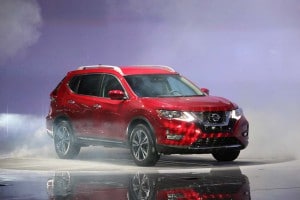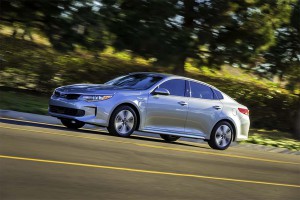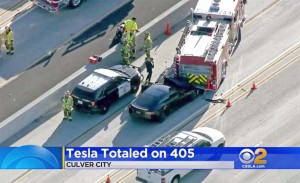Federal safety regulators are probing the automatic emergency braking system on the Nissan Rogue after receiving a litany of complaints from owners who say the driver assistance system can slam the brakes on their vehicles even if there’s no potential obstacle in the way.
The National Highway Traffic Safety Administration said it has received 843 complaints, as well as reports of 14 crashes, linked to the AEB technology on Nissan Rogues. Over 550,000 of the compact crossovers sold in the U.S. are equipped with the system. A separate class action lawsuit was filed last December and contends that the Rogue is one of several Nissan vehicles that can experience the problem – though NHTSA said its probe only targets the small crossover.
Complicating matters for Japan’s second-largest automaker, Nissan last year acknowledged the need to repair some of its products, including the Sentra sedan for essentially the opposite problem, emergency auto-braking systems whose radar systems would fail, deactivating the technology. Meanwhile, regulators and safety advocates note that auto-brake systems have been involved in a number of other recent recalls and consumer complaints.

NHTSA has received reports of 14 crashes linked to the alleged defect. When the system suddenly triggers, drivers in following vehicles may not stop in time.
Most automatic emergency braking systems rely on radar – sensors usually mounted behind the front grille – to scan the road ahead to detect potential collisions. If there could be a problem, the vehicles first sound an alert to get the driver to hit the brakes. If the motorist fails to respond, the system will automatically activate the brakes, attempting to head off a collision or, at the least, reduce the risk of damage, injuries or fatalities.
(New Study Shows Motorists Confused by High-Tech Features Like Autopilot, Super Cruise, ProPilot)
In the case of the Nissan Rogue, however, owners have reported that the system can trigger without warning – and without any obstacle to set it off. That has caused vehicles to slam on their brakes on highways and even on railroad crossings. When that happens, a driver can lose control, and the vehicle also may be rear-ended by another driver who doesn’t apply their own brakes quickly enough.
The Rogue probe was initially launched in March, based on a petition from the Washington-based Center for Auto Safety which, at the time, had received 87 complaints of false braking. The number has now ratcheted up almost tenfold, prompting NHTSA to accelerate its own investigation.
The automaker has so far declined to order a recall, telling regulators that owners of 2017 and 2018 model-year Rogues can bring their crossovers into dealers for a software upgrade that can reduce the risk of unnecessary auto-braking.
NHTSA has been receiving a growing number of owner complaints involving AEB systems offered on a wide number of different brands and products. According to industry data, the technology was installed on about half of all vehicles sold in the U.S. during the 2019 model-year. And it is expected become all but standard by 2022 as the result of a voluntary industry-government agreement that was negotiated shortly before the Obama Administration left office. Nearly two dozen different automakers signed on.
While unintended deployment has been the subject of many owner complaints, the opposite problem has also been spotlighted by motorists, systems failing to sound warnings or automatically activate brakes despite potential collisions.
A year ago this month, a spokesman for Nissan said the automaker was “aware” of a potentially faulty radar module involving the Sentra and was, at that time, developing a replacement.
Just last month, Kia said it would recall over 11,000 late-model Optima sedans because their own AEB systems might not recognize a stationary vehicle. Jaguar Land Rover is another brand that has had to order a recall due to faulty auto-brake technology.
(Federal probe blames Autopilot for failing to prevent crash. Click Here for the story.)
A separate probe this month faulted the Autopilot system used by Tesla for failing to either brake or swerve to avoid crashing into the back of a stopped firetruck. Several other probes have faulted the system which is capable of not only auto-braking but steering away from a potential collision. Additional probes are now underway in several other incidents that may have involved the Autopilot technology.
Despite such problems, however, safety experts still support the expanding use of automatic emergency braking, the Insurance Institute for Highway Institute issuing several reports over the last two years indicating the technology, when working properly, can substantially reduce the number of rear-end collisions.



